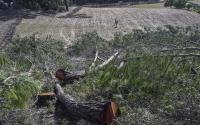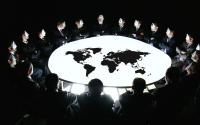18 March 2005 The Independent
President George Bush's nomination of Paul Wolfowitz as head of the World Bank has triggered reactions ranging from polite acceptance to outright hostility among foreign governments and aid groups.
Some believe he is unqualified for the job while others fear he will be all too effective in using the post to expand America's global dominance.
Although his nomination is almost certain to be accepted by the World Bank's board of directors and participating states, both the European Union and the French government made a point of saying that his assumption of the presidency is not a foregone conclusion.
The French Foreign Minister, Michel Barnier, pointedly described the nomination as a "proposal", while Jacques Chirac, the French President, was said to have "taken note" of the nomination. A European Union spokeswoman, Claude Veron-Reville, said she anticipated a round of talks to discuss Mr Wolfowitz's candidacy before any formal moves to endorse it. "A period of consultations with stakeholders is now starting," she told reporters.
Peter Mandelson, the EU trade commissioner, was quoted as saying the nomination "came as a surprise to some in Europe". In Britain, Gordon Brown's office described Mr Wolfowitz, currently Deputy Secretary of Defence, as a "very distinguished person" but said the Chancellor of the Exchequer had not had time to consider his nomination because of his preoccupation with the Budget.
Clare Short, the former international development secretary, described the nomination of the Bush administration's leading neoconservative hawk as the equivalent of sticking up "two fingers to the world". "This is really shocking," she told Channel 4 News. "It's as though they are trying to wreck our international systems."
Caroline Lucas, a British Green and member of the European Parliament, described the nomination as "an insult to the world's poor". "As a leader of the neoconservative movement," she added, "[Wolfowitz's] belief in unfettered free markets and a philosophy that what is in the US's interest is thereby in the interest of the entire world spells disaster for many countries in the developing world."
Much of the criticism of Mr Wolfowitz is focused on his lack of direct experience of the financial sector and his limited exposure to development issues - for much of his life he has been an academic and a diplomat focussed on military and strategic questions. Many experts and government officials also found it troubling that the Bush administration, in nominating someone for a job dependent on consensus-building, would pick someone who has become a symbol of US resistance to that very consensus.
Not only did Mr Wolfowitz push harder than anyone for the invasion of Iraq two years ago - with or without the approval of the rest of the world - he also has a long track record of advocacy of a strong America acting as it sees fit, pre-emptively if necessary, to protect its global interests.
"This appointment signals to developing countries that the US is just as serious about imposing its will on borrowers from the World Bank as on the countries of the Middle East," said Njoki Njoroge Njehu, a director of the US-based 50 Years is Enough Network, an outspoken critic of the World Bank.
Some governments expressed cautious satisfaction with Mr Wolfowitz's nomination, among them Japan, which called the appointment "fine", and China, which said it would be willing work with Mr Wolfowitz in the hope of maintaining what it called "a sustainable and balanced development of the world economy".
But in Europe, such accommodating language was sparse. Many observers questioned the sincerity of President Bush's recent charm offensive in Europe especially since Mr Wolfowitz's nomination followed hot on the heels of the appointment of John Bolton, a harsh critic of the United Nations, as US ambassador to the organisation. "Bolton followed by Wolfowitz sounds like a declaration of war," the French commentator Nicole Bacharan told Reuters, "and if not that, a declaration of contempt."






